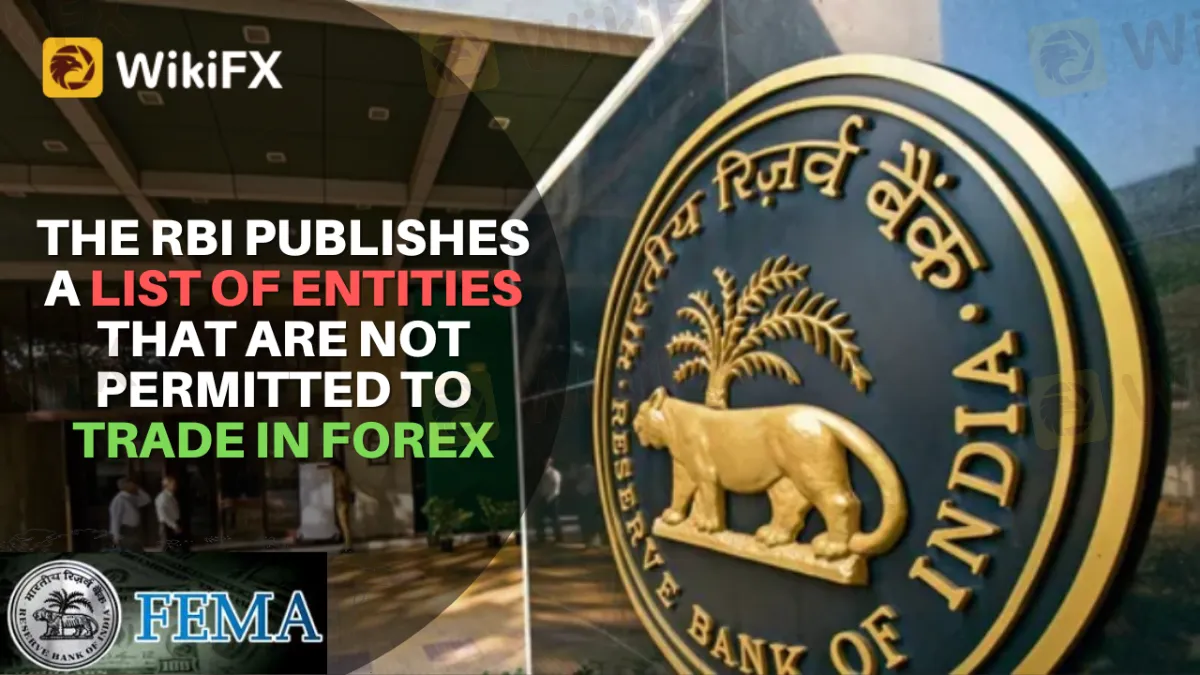简体中文
繁體中文
English
Pусский
日本語
ภาษาไทย
Tiếng Việt
Bahasa Indonesia
Español
हिन्दी
Filippiiniläinen
Français
Deutsch
Português
Türkçe
한국어
العربية
ALERT! The RBI Publishes A List Of Entities That Are Not Permitted To Trade In Forex
Abstract:The Reserve Bank of India (RBI) published a list of organizations that are not permitted to trade in foreign currency on Wednesday

The Reserve Bank of India (RBI) published a list of organizations that are not permitted to trade in foreign currency on Wednesday. It warned consumers not to conduct currency transactions on unapproved electronic trading platforms (ETPs) or remit or deposit money for unlawful forex transactions in February of this year.

The central bank has now posted an “Alert List” on its website of organizations that are not permitted to trade in forex under the Foreign Exchange Management Act of 1999 (FEMA) or to run electronic trading platforms for forex transactions.
The “Alert List” is not exhaustive, and an entity that does not appear on this list should not be assumed to be authorized by the RBI, according to the RBI, which also reiterated that resident persons can only conduct forex transactions with authorized persons and for permitted purposes under the FEMA.
List of Unauthorized Entities
AnyFX
Binomo
Expert
FinFxPro
Forex4money
Forex
FXStreet
FXNice
Bell Markets
IG Markets
NTS Forex Trading
Olymp Trade
TP Global
Trade Sight
Urban Forex
About FEMA
The Foreign Exchange Management Act, 1999 (FEMA) is an Act of the Indian Parliament that seeks to “consolidate and amend the law relating to foreign exchange with the goal of facilitating external trade and payments and promoting the orderly development and maintenance of the foreign exchange market in India.” It was enacted in parliament on December 29, 1999, to replace the Foreign Exchange Regulation Act (FERA). Crimes involving foreign exchange are now classified as civil offenses under this statute.

It applies across India, replacing FERA, which had grown incompatible with the Government of India's pro-liberalization goals. It permitted a new foreign exchange management system commensurate with the World Trade Organization's evolving framework (WTO). It also cleared the way for the 2002 Prevention of Money Laundering Act, which went into force on July 1, 2005.
Stay tuned for more regulatory news.
Download the WikiFX App from the App Store or Google Play Store.

Disclaimer:
The views in this article only represent the author's personal views, and do not constitute investment advice on this platform. This platform does not guarantee the accuracy, completeness and timeliness of the information in the article, and will not be liable for any loss caused by the use of or reliance on the information in the article.
Related broker
Read more

Top 10 Trading Indicators Every Forex Trader Should Know
Master the top 10 Forex trading indicators to analyze real-time Forex quotes, trends, and market signals. Learn strategies to boost accuracy and avoid mistakes.

Geopolitical Events: What They Are & Their Impact?
You've heard many times that geopolitical events have a significant impact on the Forex market. But do you know what geopolitical events are and how they affect the FX market? Let us learn about it today.

Why Do You Feel Scared During Trade Execution?
Trade execution is a pivotal moment for traders. It is when analysis turns into action, and potential profits or losses become reality. However, for many traders, this moment is accompanied by fear. Why does this happen, and how can you address it?

WikiEXPO Global Expert Interview: Simone Martin—— Exploring Financial Regulation Change
In the midst of financial innovation and regulation, WikiGlobal, the organizer of WikiEXPO, stays abreast of industry trends and conducts a series of insightful and distinctive interviews on pivotal topics. We are delighted to have the privilege of inviting Simone Martin for an in-depth conversation this time.
WikiFX Broker
Latest News
Geopolitical Events: What They Are & Their Impact?
Top 10 Trading Indicators Every Forex Trader Should Know
ASIC Sues Binance Australia Derivatives for Misclassifying Retail Clients
Why Do You Feel Scared During Trade Execution?
Revolut Leads UK Neobanks in the Digital Banking Revolution
Currency Calculator


